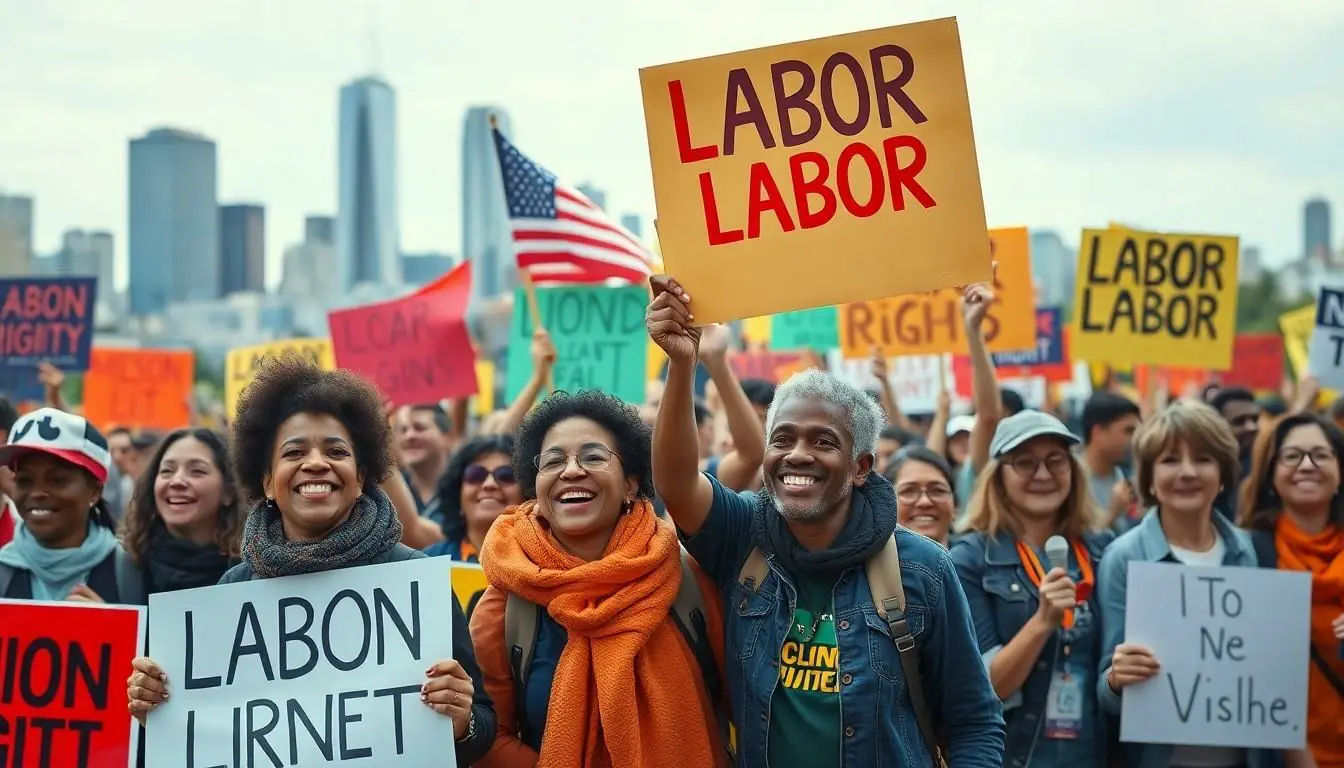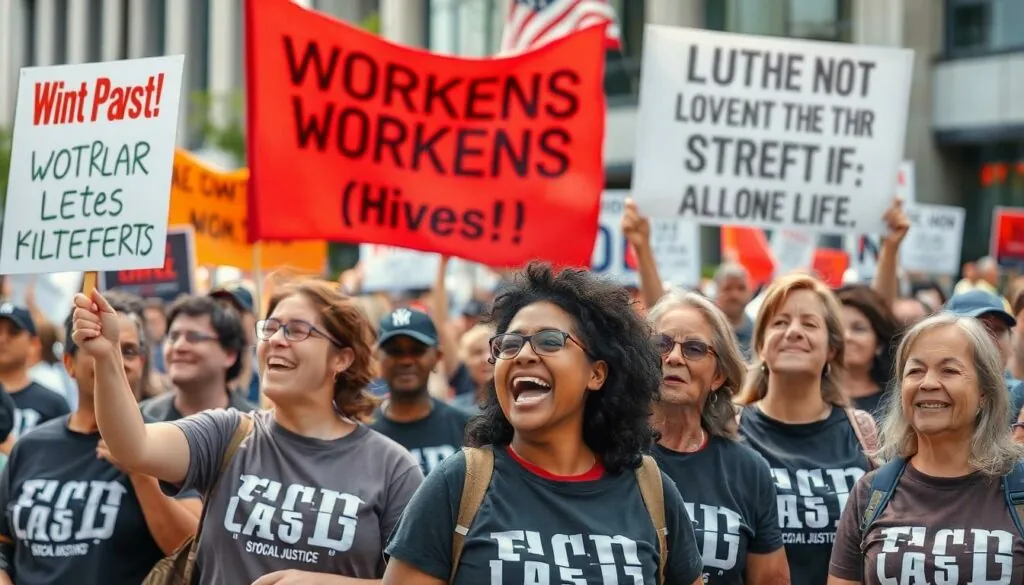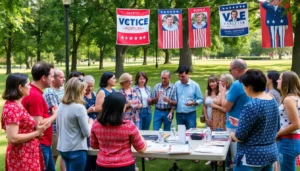Unions have long been the backbone of the working class, but when it comes to political campaigns, their wallets pack a punch. Ever wonder how much these organizations actually contribute to the political arena? Spoiler alert: it’s not chump change. From local elections to national races, unions flex their financial muscle to back candidates who champion workers’ rights.
Table of Contents
ToggleOverview of Union Political Donations
Unions significantly influence political campaigns through substantial financial contributions. In 2020, unions spent over $1.7 billion on political activities, a figure that showcases their financial clout. The bulk of this money supports candidates who prioritize labor rights and fair wages.
Political contributions come from various sources within unions, including member dues and Political Action Committees (PACs). These funds often target elections at local, state, and federal levels, demonstrating a commitment to supporting pro-labor candidates. Furthermore, unions mobilize their members to engage in grassroots campaigns and advocacy, amplifying their impact beyond just financial donations.
The American Federation of Labor and Congress of Industrial Organizations (AFL-CIO) reported that labor unions aligned their contributions with political party platforms that support worker issues. In the 2020 election cycle, unions favored Democratic candidates, reflecting the alignment of party policies with labor interests.
Data shows that unions typically allocate a significant portion of their budgets to political donations. In the 2019-2020 election cycle, more than 50% of union spending went towards independent expenditures and support for candidates. This strategy helps unions secure favorable legislation and maintain a strong presence in political discussions.
Moreover, unions engage in advocacy to promote legislation that protects workers’ rights, such as wage increases and workplace safety. Political donations serve as a mechanism to ensure that the voices of workers resonate in legislative chambers. By supporting candidates who champion these causes, unions play a vital role in shaping public policy and protecting the interests of their members.
Historical Context

Unions play a pivotal role in shaping political landscapes through their financial contributions to campaigns. Their support extends from local elections to national platforms, significantly impacting worker rights.
Evolution of Union Contributions
Over the decades, union contributions have evolved dramatically. In the early 20th century, unions primarily funded candidates through direct donations. By the late 20th century, political action committees emerged, providing unions with a structured way to channel contributions. In 2020, unions spent over $1.7 billion on political activities, reflecting their increasing political engagement. Activating grassroots campaigns became a core strategy, amplifying their financial contributions. Unions now align donations with political party platforms, fostering deeper connections with candidates advocating for labor rights.
Key Legislation Impacting Donations
Legislation has significantly influenced union campaign donations. The Taft-Hartley Act of 1947 restricted certain political activities by unions, reshaping their financial contributions. In recent years, the Citizens United v. FEC ruling in 2010 expanded avenues for political donations, granting unions more freedom to engage. Unions responded by increasing independent expenditures, ensuring they effectively support candidates who prioritize worker issues. Legislative changes prompted unions to adapt their strategies and strengthen their political clout. As a result, unions focus their efforts on programs that mobilize members for political action, reinforcing their influence on legislative agendas.
Current Trends in Union Donations
Unions play a pivotal role in funding political campaigns, reflecting the priorities of their members. Their contributions target candidates who advocate for labor rights and social justice.
Amounts Contributed by Major Unions
Major unions significantly influence political donations. In the 2020 election cycle, the American Federation of Labor and Congress of Industrial Organizations (AFL-CIO) alongside other unions contributed large sums, exemplifying their commitment to worker issues. Unions collectively spent over $1.7 billion on political activities. A substantial portion of these funds supported Democratic candidates favoring labor rights and fair wages. Contributions stem from both member dues and Political Action Committees, enhancing their overall financial impact.
Comparison to Other Political Donations
Union donations surpass many traditional political contributions, highlighting their unique role. In the 2019-2020 election cycle, over 50% of union spending focused on independent expenditures and candidate support. Comparatively, individual contributions often lack the same coordinated effort seen in union-backed donations. While corporate donations primarily serve business interests, unions prioritize worker rights in their funding decisions. This differentiates union contributions from other political donations and underscores their significant influence on legislative agendas.
Influence of Union Donations on Elections
Union donations significantly impact elections across various levels, from local contests to national races. Unions actively support candidates who advocate for workers’ rights, amplifying their influence in the political arena.
Case Studies of Notable Elections
In the 2020 election cycle, unions contributed nearly $1.7 billion to political activities, showcasing their substantial financial power. Notably, labor unions backed Democratic candidates overwhelmingly, correlating their contributions with party platforms prioritizing worker issues. The American Federation of Labor and Congress of Industrial Organizations (AFL-CIO) reported that over half of total union spending went to independent expenditures and candidate support. These strategic contributions played a crucial role in securing favorable legislation aimed at protecting labor rights, further solidifying unions’ political presence.
Analyzing Union Endorsements
Analyzing endorsements reveals unions prioritize candidates committed to labor rights and social justice. Candidates backed by unions often experience increased visibility and support among union memberships. As unions mobilize their members for grassroots campaigns, these endorsements translate into tangible political power, influencing voter behavior. The emphasis on endorsing candidates aligned with union goals demonstrates an ongoing commitment to advocating for workers. Endorsements also serve to highlight the critical role unions play in shaping public policy and legislative agendas that directly impact their members’ livelihoods.
Challenges and Controversies
Union political spending faces various criticisms and challenges. Critics argue that unions, by contributing large sums to campaigns, could distort the political landscape. Some suggest this financial influence threatens democratic processes, suggesting unions prioritize their interests over constituents’ needs. In 2020, unions spent over $1.7 billion, raising concerns about the overall impact of such contributions on election outcomes. Many believe unions’ significant backing of Democratic candidates risks alienating moderate voices, heightening polarization within political spheres. Additionally, concerns exist regarding transparency; voters expect to see clear disclosures of union campaign financing.
Legal and ethical dimensions also surround union donations. The Taft-Hartley Act restricts direct union contributions, driving unions to adapt strategies through PACs. This landscape shifts discussions towards ethical implications of union political activities. Organizations must ensure compliance with federal regulations as political contributions increase. Advocates often emphasize the necessity for heightened transparency in political fundraising to foster public trust. With unions mobilizing millions for causes aligned with worker rights, questions arise about how these contributions align with broader social justice efforts. Understanding these factors helps clarify the ongoing debates about unions’ roles in political finance and advocacy.
Unions continue to wield significant influence in political campaigns through their substantial financial contributions. By prioritizing candidates who advocate for labor rights and social justice, they ensure that the voices of workers resonate in legislative discussions. Their strategic use of member dues and PACs amplifies their impact beyond mere financial donations.
As the political landscape evolves, unions face challenges regarding transparency and the perception of their influence. However, their commitment to mobilizing members for grassroots campaigns reinforces their critical role in shaping public policy. The ongoing dialogue about union contributions highlights the importance of balancing political power with accountability, ensuring that the interests of workers remain at the forefront of political agendas.





